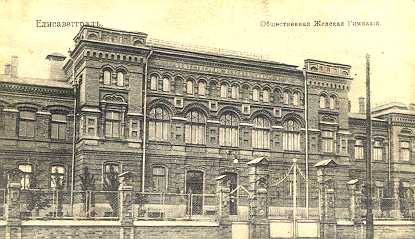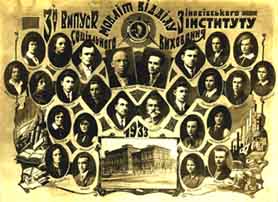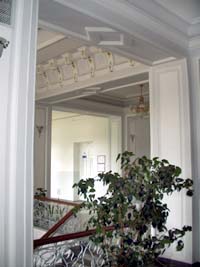History
 Teacher education has a long history in Kirovohrad region. As far back as 1881 the additional VIIIth teacher training class was opened at the Public Girls' Gymnasium of Yelysavethrad town (Zhinocha Himnaziya).Its graduates used to become primary school teachers or engaged in ""free teaching"". At the beginning of the XX century a people's teacher could also get education at teacher training courses or seminary.
Teacher education has a long history in Kirovohrad region. As far back as 1881 the additional VIIIth teacher training class was opened at the Public Girls' Gymnasium of Yelysavethrad town (Zhinocha Himnaziya).Its graduates used to become primary school teachers or engaged in ""free teaching"". At the beginning of the XX century a people's teacher could also get education at teacher training courses or seminary.
During turbulent years of the Ukrainian National Revolution, there appeared an urgent need to train qualified teachers for the new Ukrainian school. In summer and autumn of 1918 figures of Yelysavethrad town council and ""Prosvita"" society began to demand from the Government of Hetman P. Skoropadsky the resolution to open a Pedagogical University in Yelysavethrad town. But real attempts to implement these plans were made only during the reign of the next Ukrainian government due to the substantial support of our townman, president of Dyrectory, Volodymyr Vynnychenko. On 26 January 1919 UNR Directory adopted a resolution to establish a teacher training institution in Yelysavethrad. But due to Dyrectory’s failure those plans did not answer, even the news about the resolution on teachers’ institute lost somewhere on the bloody paths of war and never came to Yelysavethrad.
The first real step to creating a higher pedagogical institution on Yelysavethrad land was opening on 1 June 1921 of Higher Teacher Training Courses that prepared primary schools teachers. The fight against illiteracy expanded in the region then, there was a lack of teachers in schools, so teacher training courses graduates worked not only on the primary level, but often became the teachers of all high school subjects, they also did a large community and educational work among the population.
In 1925 Teacher Training Courses were reorganized into Zinovyevsk Pedagogical College, which continued to train teachers for primary schools. There was a lack of money, equipment, studies. In 1927 the Pedagogical College obtained a building of the former Girls’ High School, which became home for many generations of graduates of our university.
The region constantly lacked senior forms teachers of seven years study schools. The reorganization of the educational system, which began in 1929, led to the formation of the first departments within the Pedagogical College, which marked the beginning of its transformation into a social education institute with a three-year term of study.
On 1 October 1930, USSR Council of People's Commissars adopted a formal resolution on the opening of the National Education Institute, which consisted of four departments: Engineering and Mathematics, Agro-Biology, History and Economics, and Linguistics and literature. There were created five chairs: Mathematics, Biology, History, Pedagogy, the Ukrainian Language and Literature. The Institute employed 26 teachers. Over 300 students studied there.
 In 1933 the Social Education Institute reorganized into the Pedagogical Institute with the departments of Physics and Mathematics and Chemistry and Biology available for four years education term. The number of teachers increased to 32, 7 chairs were in work. In 1935 the Teachers' Institute with two-year study term formed at the Pedagogical Institute of Kirovohrad. Simultaneously students of II-IV study courses continued studying and worked after the pedagogical institute curriculum. At that moment there were 9 chairs, employing 54 teachers. . In July 1937 Kirovohrad Institute simultaneously graduated students of both Pedagogical and Teachers' Institutes, and early sent the third year study students to work. 508 required qualified teachers of mathematics, chemistry and biology, natural history and geography were sent to the regional schools.
In 1933 the Social Education Institute reorganized into the Pedagogical Institute with the departments of Physics and Mathematics and Chemistry and Biology available for four years education term. The number of teachers increased to 32, 7 chairs were in work. In 1935 the Teachers' Institute with two-year study term formed at the Pedagogical Institute of Kirovohrad. Simultaneously students of II-IV study courses continued studying and worked after the pedagogical institute curriculum. At that moment there were 9 chairs, employing 54 teachers. . In July 1937 Kirovohrad Institute simultaneously graduated students of both Pedagogical and Teachers' Institutes, and early sent the third year study students to work. 508 required qualified teachers of mathematics, chemistry and biology, natural history and geography were sent to the regional schools.
In September 1937, the third department - Language and Literature, with two pisions: Russian and Ukrainian – was organized at the Teachers’ Institute. At that time 530 students studied there. Studies and educational work was being provided by 10 chairs: Physics, Mathematics, Natural Sciences, Chemistry, Pedagogy, Foundations of Marxism-Leninism, Geography, Military and Physical Training, Russian Language and Literature, Ukrainian Language and Literature. There were founded 9 education classrooms, 5 laboratories. The Institute was growing, the number of students and teachers was increasing, and the material and technical resources were improving.
On 1 September 1939 along with the Teachers’ Institute, Pedagogical Institute was being restored too. It consisted of three departments: Physics and Mathematics, Geography, Language and Literature with Russian and Ukrainian pisions. In pre-war years the Kirovohrad Institute had grew into a large educational complex, consisting of full-day and part-time Pedagogical and Teachers’ Institutes and Extension Teachers' Institute. 12 research chairs worked there with 62 persons of the faculty. The Institute had one academic building, 5 laboratories, 9 studies, library with 80 thousand volumes, a botanical garden with a green-house, and 3 workshops. Moreover, the Workers’ Department worked at the Institute. From 1929 to 1941 Pedagogical and Teachers’ Institutes of Kirovohrad trained 2025 highly skilled school teachers.
The fire tornado of war broke the peaceful life of people, remade the fates of teachers and students of the Institute. With arms they came to protect their native homeland. Among those who died in the battles of the WWII fronts, in the Nazi torture chambers are: the Deputy Director of the Institute Oleksiy Mykytovych Kotsyuba, Party Bureau Secretary Serhiy Mykolayovych Ostapenko, the Secretary of Lenin Communist Youth of Ukraine (ËÊÑÌÓ) Committee Vasyl Oleksiyovych Dyky, Assistant Director Mykhaylo Moyseyovych Karnaukh, teachers Petro Fedorovych Nepomnyaschy, Bentsion Yakovych Holtsman, Pavlo Feoktystovych Romanovsky, Fedot Kononovych Syvovna, graduate Lieutenant Anton Antonovych Bohun. Former students Petro Ivanovych Lakhman, Olena Zakharivna Buryanova and other young patriots were fighting against the enemy in the secret sabotage forces.
In January 1944 Kirovohrad was liberated from Nazi invaders. Restoring of Pedagogical Institute that had suffered heavy losses began immediately: studies and laboratories had been broken down and ransacked, books from libraries had been plundered and burnt, and two buildings of dormitories had been destroyed. The total losses amounted to over 6 million rubles. The premises of the Institute (formerly Girls’ High School) had been equipped for hospital.
Sydor Karpovych Korolyuk was appointed for a post of Director and headed the Institute since 1936. Not later than on March 25 1944 classes started, 382 students were welcomed again. There was a lack of qualified teachers; repressions had a great impact too. Yet for the first time a small body of teachers and researchers had formed in the Institute then. The following people worked there: Doctor of Mathematics - Livshyts, four associate professors and candidates of science, two senior teachers committed to defending thesis. In 1948-1949 academic year the University had employed 77 persons of the faculty, among them - 1 professor, 5 associate professors, 31 senior teachers, 40 teachers and assistants. In the fifties, nine volumes of scientific institute notes were issued which showed the developed scientific potential of the Institute. In 1955 teachers of two-year study period graduated for the last time, and the Institute started higher education training based on the curricula of Pedagogical Institute.
The Institute was developing, the number of departments and chairs was growing, and the quality of education and training was improving too. In 1956 the Physical Education Teachers’ Training College became the Physical Education Department of the Institute. In 1959 the Pedagogy Department started its work, training elementary school teachers with higher education. In 1962 the English Language Department opened, and in 1967 – the Music and Pedagogy Department. The History Department resumed their work since September of 1978.
The Institute was expanding, new academic buildings, dormitories were being built. Laboratories continued to open. Great contribution to the development of the Pedagogical Institute had been made by its rector Fedir Hnatovych Ovcharenko, who began working in 1967. His life motto was the service to the people and the chosen profession. In the early 70's nearly 4 thousand students were mastering teaching profession in Kirovohrad State Pedagogical Institute. In 1978 Oleh Yevhenovych Polyarush became the Rector of the Pedagogical Institute, who remained in office for a quarter of a century. The rapid development of a small provincial institute and its transformation into a true scientific and educational center of the region was confirmed in 1982 when the Institute staff won the Socialist Competition among Higher Pedagogical Institutions of the USSR.

In the mid 90's the Pedagogical Institute enters the new frontiers of its progress. There was created Educational and Scientific Production Complex "“Continuing Education”", which included the best secondary education establishments of the region, the regional branch of the Small Academy of Sciences began their work, Master’s Degree Programme was originated. In April 4, 1997 by the decree of the Cabinet of Ministers of Ukraine, Kirovohrad State Pedagogical Institute was granted the status of the State Pedagogical University. This event marked a new phase in the history of the higher pedagogical establishment in Kirovohrad.
From May 2003 till April 2005 the rector’s post was occupied by the Doctor of Pedagogy, Professor Valeriy Viktorovych Radul.
In November 2005 the Doctor of Philology, Professor Hryhoriy Dmytrovych Klochek, was elected to be the rector of the University. In December 2010 Professor Vitaliy Ivanovych Zavina was elected to be a rector, but he tragically died. In July 2011 the Doctor of Philology, Professor Oleh Anatoliyovych Semenyuk became a rector of Kirovohrad State Pedagogical University.
Nowadays, the aim of educational activities of the Kirovohrad State Pedagogical University named after Volodymyr Vynnychenko is training a new generation of professionals with educational level, worthy of the best universities in the world. They can work in conditions of Ukraine's integration into the global community and compete in the global labor market. In recent years the University has met wide recognition and prestige among applicants, teaching and research community.


